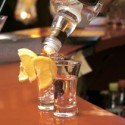Major Report Finds Screening and Early Intervention Program Used in Diverse Health Care Settings Dramatically Reduces Illicit Drug Use among Patients
Report found a 67.7 percent reduction in illicit drug use over a six month period among people receiving these services
The Screening, Brief Intervention, and Referral to Treatment (SBIRT) program can reduce illicit drug use among patients seeking medical care in a wide variety of health care settings such as hospitals, physician offices, and community clinics, a study finds.
SBIRT uses a variety of techniques to screen patients seeking medical health for signs of substance abuse. If a patient screens positive for a substance abuse problem immediate steps are taken to help the patient effectively deal with the problem before the patient’s health and well-being deteriorate.
The report in the journal Drug and Alcohol Dependence found that rates of illicit drug use dropped by 67.7 percent six months after patients using illicit drugs had received help through a SBIRT program. In addition, heavy alcohol use dropped by 38.6 percent. Illicit drug users receiving brief treatment or referral to specialty treatment also reported other quality of life improvements:
- 29.3 percent reported feeling generally healthier
- 31.2 percent reported experiencing fewer emotional problems
- 15.4 percent reported improved employment status
- 64.3 percent reported fewer arrests
- 45.8 percent who were homeless reported no longer being homeless
Currently, most screening and brief intervention programs are directed primarily toward screening and assisting patients to reduce heavy alcohol use — a use for which SBIRT has long been shown to be highly effective.
To help expand SBIRT use and determine its efficacy for addressing illicit drug use and alcohol use, the Substance Abuse and Mental Health Services Administration (SAMHSA) began awarding grants to states and tribal organizations beginning in 2003. The report announced today is based on an analysis of the data provided by six of the grant recipients.
SBIRT can be used in a wide variety of health care settings including primary care centers, hospital emergency rooms, trauma centers, and other community settings, and provides options for addressing the particular substance abuse problems of patients.
For many patients with less severe problems a health care provider may briefly intervene by discussing the problem with the patient and offering steps to address it. Brief treatments for the problem may also be offered within the healthcare setting or a community setting. In more severe cases, a health care provider usually refers the patient to a more specialized setting for assessment, diagnosis, and appropriate treatment.
“Over 20 million Americans with substance abuse problems don’t get the treatment they need – largely because they don’t seek it,” said SAMHSA Acting Administrator Eric Broderick, D.D.S., M.P.H. “These findings show that SBIRT can play an important role in helping people recognize they may have a substance abuse problem and that help is available.”
The article was authored by Dr. Bertha Madras, former deputy director for Demand Reduction at the Office of National Drug Control Policy (ONDCP) and currently at Harvard Medical School; Dr. Wilson Compton of the National Institute on Drug Abuse (NIDA), National Institutes of Health; and Dr. H. Westley Clark, Ms. Deepa Avula, Mr. Tom Stegbauer, and Dr. Jack Stein of SAMHSA.
The report was based on data drawn from a network of health care facilities treating a wide variety of patient populations. At least 459,599 patients seeking medical treatment at these facilities were screened for alcohol and illicit drug use during the course of the study, with 104,505 (27 percent) screening positive for heavy alcohol or illicit drug use.
Programs followed up with a random sample of patients screening positive for heavy alcohol or illicit drug use to determine whether their alcohol and illicit drug use levels had changed six months after they had been screened in the SBIRT program.
“We see great promise in this approach to identifying those most in need of intervention and treatment for substance abuse problems,” said NIDA Director Nora D.Volkow. “We are committed to learning more. NIDA has awarded over $4.2 million in new grants this year alone for more SBIRT clinical trials in real-life settings.”
“Promoting services like SBIRT to all parts of the nation is a crucial part of SAMHSA’s mission to reach everyone struggling with substance abuse issues,” said Dr. H. Westley Clark, director of SAMHSA’s Center for Substance Abuse Treatment.
A copy of the complete report is available at http://dx.doi.org/10.1016/j.drugalcdep.2008.08.003
________________
source: SAMHSA
